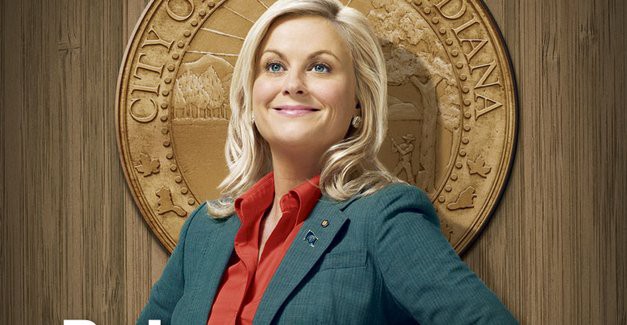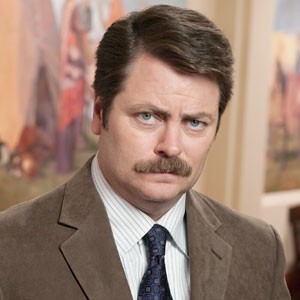The Weird, Frictionless Politics Of 'Parks And Recreation'
The Weird, Frictionless Politics Of ‘Parks And Recreation’
by Mike Barthel

There are a lot of different ways to say that NBC’s “Parks and Recreation” is a very upbeat show. Willa Paskin classified the show as a “comedy of niceness.” Showrunner Michael Schur points out that everyone on the show is passionate about something. James Poniewozik talks about how the show is sincere where others are ironic. And at Splitsider, AJ Aronstein focused on the show’s optimistic view of politics. But here’s another way to say it: the show is twee.
Twee is a loaded word, but twee things are not necessarily bad. April and Andy’s relationship, from their individual personalities right down to their manic pixie dream girl wedding (so kooky, so spontaneous!), is fundamentally twee, and it’s fun to watch. So are things like Leslie’s love of waffles, Ann Perkins’ bafflement about men, and Rob Lowe’s entire character. But the sort of childish optimism that makes “Parks and Rec” so entertaining can, at its worst, edge into self-satisfaction, encouraging a willful retreat from the world as it is into an uncomplicated, low-stakes vision of the world as people with anxiety problems would like it to be. You could see that clash when Ben moved in with April and Andy and was legitimately appalled by their inability to take care of themselves as adults. The whole third season of the show consisted of every other character trying to make Ben more twee, and while it’s been great television, it’s weird politics. Ben’s job is to keep Pawnee running within its budget, but people keep insisting that he can just go ahead and spend more money without worrying where it’s going to come from. When Ben gives an individual money for plates and he instead buys a marshmallow shooter, that’s hilarious. But when Ben gives the parks department more money, that money comes out of someone else’s budget. Maybe it’s a social program, maybe it’s the schools. No matter how well-intentioned, that decision is not without consequence, and pretending otherwise just validates the very twee, very middle-class vision of living in the world. There’s always more money somewhere, right?
I may be the only person in the world who really liked the first season of “Parks & Rec.” I was excited to see something on network television that depicted the administrative aspect of politics accurately, and I loved the clash between Leslie’s sincere ideals — she really did want to build a park, and she really did think government could help people (nevermind Paskin’s calling her a clone of the eternally self-centered Michael Scott) — and the difficulty she had putting them into practice. In the second episode, Leslie eagerly hosts a public meeting, hoping to impress her hardened realpolitik mom, but gets blindsided by angry comments and has to filibuster her way out of it. There was something really at stake there: if Leslie didn’t make that cheap and transparently desperate last-minute move, the project would have been dead. Contrast that to this season, when, as Paskin puts it, there’s never any chance that Leslie will fail, just “the possibility they will not meet her very high standards.” Since we like her, that’s great. But a politics in which there’s never any chance of one person failing isn’t a democracy. If you look at it from the other ideological pole, Leslie’s not a more successful Obama. She’s a liberal Dick Cheney.
Take, too, season one’s fifth episode, “The Banquet.” Leslie needs to get a meeting with a zoning official for the project to move forward, and her mother urges her to exploit some personal information she has about the official to get what she wants. Leslie is uncomfortable with this, but considers doing it anyway because it’s a means to her desired end. The way events fall out is a perfect representation of what it’s like to be an outsider in politics: after taking the high road but failing, Leslie gives in and tries to blackmail the official, but does it so awkwardly that it blows up in her face. The episode highlights that what matters in politics isn’t the strength of your ideals but your command of the process, and that you can’t help anyone without a killer instinct. Leslie’s very twee-ness places her outside the old-boys network that would teach her those skills, and she has to decide whether she cares more about being true to herself or about achieving what she thinks is right. Watching her navigate a compromise between ideals and goals was fascinating. It spoke to the essential political need to sublimate your own desires to the collective activity in which government workers are always involved. But in the current season, this tension has been removed. Leslie never has to navigate morally problematic situations. Her problems negotiating the power structures of city government have somehow disappeared, and though she had been an outsider just two years prior, she now knows everyone in town intimately. When she runs into a problem with a park split over two towns, she just gets the gang together and builds a baseball field in a day. It’s a lovely ending; but as a reflection of politics, it’s on a par with acting like we’re in a Mickey Rooney picture. Let’s put on a show! Let’s balance the budget! C’mon, gang!
Poniewozik wrote that the first season had “an off-putting dark edge.” It may be true that the show’s tendency to not always have everything work out displeased the audience (though according to the Wikipedia, there were about a million fewer average viewers per show for seasons two and three than there were for season one). But the idea of a show about politics without a dark edge seems deeply weird to me. Politics is the business of power, and one of the oldest human endeavors. How is that not going to be a little dark? That people expect politics to be some sort of folksy, sincere charm-off is one of the biggest reasons people like Leslie tend to be unsuccessful once they actually get into government, a reality that was part of the first season but utterly gone by the third. There’s certainly nothing wrong with the “comedy of niceness” as it’s practiced in some places, particularly non-narrative or non-representational places like Jimmy Fallon’s show or Beyoncé’s music. But our ideas about institutions like government (or the health care industry, or the courts, or advertising) are powerfully shaped by how they are portrayed in popular culture. And many of the writers above have talked about how “Parks & Rec” represents a heartening vision of politics. But if that vision isn’t based in any sort of reality, do we want to let it ride anyway? Or can the fantasy do more harm than good? Are we really well served by unrealistic visions of how pleasant politics could be?

Another example is Ron Swanson, one of the most beloved characters on the show. And why not: he likes steaks and whiskey and emotional reticence, just like hipster boys everywhere! But in season one, Ron wasn’t part of the gang. He was an obstacle in Leslie’s path. And that’s the role you’ll find people like Ron playing in administrative departments around the country: working to cut or eliminate social programs, to ensure that taxes aren’t raised, and to outsource vital services. These paradoxically anti-government government employees get away with it not because there’s broad agreement with their ideological position. While only 15% of Americans are libertarian, most people still agree that government is the problem. That’s not because they dislike the idea of government. It’s because they have a fundamental distrust of this government, of government right now. But what can we do about that? Well, if you think about trust as the distance between what we expect the government to do and how it actually performs, then there are two angles to work. One is Leslie’s: act more trustworthy! But no matter how trustworthy government officials are, it won’t make a difference if our expectations for government are impossibly high. If we expect government to work in the way it does on “Parks and Rec” — convivially, quickly, logically, joyously — then we will always be disappointed, we will always distrust those who work in our interests, and the Ron Swansons of the world will always win.
“Parks and Rec” presents a provincial utopia of philosoraptor-kings in which there are never competing legitimate interests, never hard choices, and never any need to engage in political maneuvering. Between seasons one and three, Leslie Knope’s fiefdom transformed from a recognizable example of small-city politics to a kind of put-a-bird-on-it polis where decisions are made not on the basis of power (or analytical rigor) but out of authenticity, whimsy and friendship. Easy enough when all that’s at stake are things like parks and zoos and festivals with tiny horses; but if Leslie and the gang ever had to deal with the real issues facing municipalities — that is, things like schools, taxes, and infrastructure — that just wouldn’t fly. Some viewers may like this optimistic vision of politics, but I’d argue that the vision isn’t optimistic, it’s fundamentally unreal. Leslie’s department within the Pawnee government is the political equivalent of Li’l Sebastian: they never have to do any real work, and they never have to win any races. They just have to stand around looking adorable. And that’s a great thing for sitcom characters to do. But it’s a dangerous way to expect politics to work.
Mike Barthel does this sort of thing for a living.
